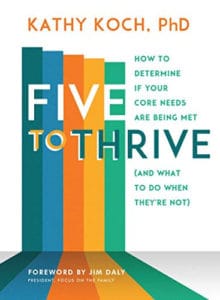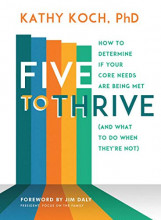Preview:
Man #1: I think my core need as an introvert is to get some alone time with a book and a nice cup of coffee.
Woman #1: I need every day to do some kind of physical activity and get some exercise in.
Man #2: The greatest need in my life is sleep.
Woman #2: I would say one of my core needs, um, in addition to coffee, is just medication. I mean, having an autoimmune disease, I would literally be dead if this technology didn’t exist.
Man #3: One of my greatest core needs in my marriage is to be liked.
End of Preview
John Fuller: Well, how about you? Do any of those comments resonate with you, or are you looking for something different? On today’s Focus on the Family, we’ll explore this concept of needs and how we try to meet them, sometimes in healthy or unhealthy ways. Your host is Focus president and author Jim Daly, and I’m John Fuller.
Jim Daly: John, I suppose if we asked our listeners to make a list of their needs, the options would be endless because, boy, my need for a donut is sky-high. (laughs)
John: (laughs)
Jim: You know, uh, we’re generally needy people. That’s the way we come into this world. It’s the way we go out. And there are things we’d like to have or would, uh, like to change in our lives, throughout our lives. I mean, how many times, uh, if I can just lose a few more pounds, right? On the other hand, uh, I’m sure we’d find a lot of similarities on these lists, a lot of commonality, things like happiness, success, um, maybe most importantly, being loved. Um, who doesn’t want those things? We all do at our core. And these needs are common, uh, to the human experience. And as we’re gonna learn today, from our great guest, uh, being needy is part of God’s design. He wants us and has built us for relationship where we can do something to meet one another’s needs in that way. And sometimes we forget that in a very solitary culture like ours has become. Um, I’m excited to talk about this, so man, pull up a chair. Get a tea or coffee or-
John: Or a donut. (laughs)
Jim: … whatever you’d like. (laughs) Or a donut to dip in. And let’s talk about it.
John: Yeah. We have a great guest here. Dr. Kathy Koch is back with us again, and, uh, she’s the Founder and President of Celebrate Kids. She’s an author, speaker, educational psychologist, and former teacher. And her passion is to help people experience God’s best in their lives as they think and learn, and interact with each other. And she has a book that we’re gonna be talking about today, Five to Thrive: How to Determine If Your Core Needs Are Being Met (and What to Do When They’re Not). Get your copy by calling 800-A-FAMILY, or stop by focusonthefamily.com/broadcast.
Jim: Kathy, welcome back to Focus.
Dr. Kathy Koch: Thank you so much, Jim. It’s a delight to be here.
Jim: You know, one of the things that’s just, as I was listening to John, I’m sure someone, or many, are th-, saying, “Meeting our core needs? That doesn’t even sound Christian ’cause it’s about selflessness.” So talk, first off, just about that tug of war. Is, is it selfish for us to identify these core needs and say that they need to be met?
Dr. Koch: It’s not once you understand what the core needs are.
Jim: Okay. Good. I just wanna put people at ease that may have-
Dr. Koch: Yeah.
Jim: … had that initial reaction.
Dr. Koch: That’s a great comment. Like a donut is not-
Jim: (laughs)
Dr. Koch: … a core need.
Jim: Hey!
Dr. Koch: You know.
Jim: Are you kidding me? (laughs)
Dr. Koch: No. A donut is a want.
Jim: Okay. Right now, we’re in disagreement. (laughs)
Dr. Koch: And, and, you know-
John: Well, hang on. It’s a throw down at Focus on the Family. (laughs)
Dr. Koch: Whoa.
Jim: Okay. By the way, for all the doctors listening, I know donuts are not good for you. Okay? So, uh, don’t email me about that.
John: So a donut is a want.
Jim: But an-
Dr. Koch: And-
Jim: … old-fashioned’s pretty good.
John: (laughs)
Dr. Koch: (laughs) Yeah. You know, and happiness is a want. Right? So I think if people confuse needs with wants, then it may feel inappropriate, and it may feel self-centered and selfish and not biblical. But these core needs are absolutely created in us by God.
Jim: Okay. And we’re gonna get to these for the listeners.
Dr. Koch: Good.
Jim: We’re gonna unfold these. But right at the beginning here, let’s ask that question. Why is the idea of meeting these core needs so important?
Dr. Koch: Emptiness. Right? It’s got to be filled. And you know, without the … You use the core again. Without a solid foundation, without a completeness, then we’re always lacking and looking for more.
Jim: Yeah.
Dr. Koch: Almost in a, an aggressive, kind of I’m dissatisfied, I can’t ever be content kind of way. And, of course, for believers, there must be a place where we land, and we believe and contentment rises there.
Jim: Yeah. No, I, I like that. And I think so often, like with marriage experts I’m talking to, when you look at a person who’s had, uh, an affair, I’ve often asked, “Okay, what is going on there?” because it seems superficial, the act of it. So what’s really the pull to jettison everything that you have with your spouse and then reach for something that’s like the forbidden fruit? And then what’s the outcome of that? There’s other stuff at play. It’s just not the gratification of a physical act. Correct?
Dr. Koch: Absolutely. I, I would advocate for the reality that there’s an unmet need that that person needed met and saw what I would call a counterfeit way to get it met, that he or she thought would be satisfying.
Jim: Yeah.
Dr. Koch: And then, when it’s ultimately not satisfying after a period of time, then you go for another-
Jim: Yes.
Dr. Koch: What’s the next best, if you will, drug?
Jim: And that’s a, you know, that is a, an example that is, uh, eye-popping. But you can apply this almost in every area of your life. Whatever you’re filling that core need with that isn’t healthy, isn’t godly. Right?
Dr. Koch: Absolutely. And-
Jim: All right.
Dr. Koch: Yeah.
Jim: Let me, let me, first, for the listener again, can you just name the five so they can get an idea in their head what you’re talking about?
Dr. Koch: Yeah. I’d love to. Um, and I’ll define them with the question that goes along with the core need. So it’s-
Jim: And then we’ll dig into them.
Dr. Koch: Great. Security. Who can I trust? Identity. Who am I? Belonging. Who wants me? Purpose. Why am I alive? Competence. What do I do well?
Jim: Yeah. And those are the five.
Dr. Koch: Mm-hmm.
Jim: So let’s unpack it. Um, explain why you believe God, uh, created us with these holes, that we have these needs in the first place. Why do, uh, those holes, uh, exist, and what do they look like?
Dr. Koch: You know, we were created to be in relationship with God through faith in Christ, right?
Jim: Mm-hmm.
Dr. Koch: He created us to worship, to know him, to make him known, to want more of him. Um, he is the solution that we’re looking for. He created us to have the need so we would find him. And until we find him and really commit and become Christ followers in a very real way, we’re going to be lacking. And I have great hope that those who don’t yet know Christ will find him-
Jim: Yeah.
Dr. Koch: … as they’re driven to more of a completeness, and they find out that, you know, things won’t satisfy security, but people will, and people disappoint, but God doesn’t.
Jim: Yeah.
Dr. Koch: Now, they may feel God does ’cause they don’t know him well enough yet to understand all of that. And that’s why you do what you do so well here at Focus, is to keep driving people to the reality that it is of God that you really find love.
Jim: That’s where the answer is.
Dr. Koch: Absolutely.
Jim: Yeah. That’s true for everybody, too, by the way.
Dr. Koch: Mm-hmm.
Jim: Uh, Christians are not unique that way. When you look at the pain in the world, the brokenness, uh, name the identity group, whatever it might be, my observation is the thing they’re lacking most is a connection to God.
Dr. Koch: Mm-hmm.
Jim: And so many things fall into place when you know wh-, who you are-
Dr. Koch: Right. We-
Jim: … in Christ.
Dr. Koch: Exactly.
Jim: You know, I remember, uh, and I’d love your reaction to this, speaking to a really popular guest that we had, Rosaria Butterfield, who’s a former lesbian, uh, women’s studies, queer studies, at Syracuse University. Something she said as a PhD in American literature, it changed the way I see humanity. It’s, it was that powerful-
John: Mm-hmm. I remember this. Yeah.
Jim: … when she said in that kind of American literature context. She said, “When the pastor and his wife invited me over for dinner and they spent two and a half years ministering to her in fellowship and hospitality, having her over for dinner and talking through the scriptures, in an … I think it was two and a half years. She then committed to Christ.” But she said, “What I realized is I was living by my verb, lesbian, not my noun, made in his image.” Isn’t that beautiful? And that’s-
Dr. Koch: Beautiful.
Jim: … kind of what you’re saying here, that we’re often buying the lie, the verb of who we see ourselves, and we don’t realize who we are, our identity as the noun, made in his image.
Dr. Koch: Right. Absolutely. And when we know that and the knowing of our knowing, it affects our security, our identity, our belonging, our purpose, and our competence.
Jim: Yeah.
Dr. Koch: And today for our children, teens, and adults of all ages, there are so many voices and so many mixed messages-
Jim: Yeah.
Dr. Koch: … that it becomes, I think, much more difficult to land on truth. But we have to.
Jim: And, you know, for the person listening, and we have a number of nonbelievers who listen to Focus. They’re tuning in, I’m sure, for good marriage and parenting advice. This is the place to start, is a relationship with Christ. We can’t do much to help you if you don’t consider who he is and what he claims. So let me invite you to think about that if you don’t know the Lord as we carry through this conversation. Uh, Kathy, you and I have talked a lot, and you’ve been here several times, and you share a story about growing up and some of the problems … ’cause you’re tall and you self-described as clumsy-
Dr. Koch: Mm-hmm.
Jim: … as a little girl, who actually was a big girl. Speak to that pain of that and what, how that helped shape some of your attitudes and, and your own hurts.
Dr. Koch: I really appreciate that. And it was my own pain. I, I actually really like that phrase. And it might feel very insignificant to other people listening with really significant issues. So we don’t wanna downplay that. But we all do have our brokenness and our pain and our, um, whatever. So I was six years old. I was too tall. I stood out in a crowd. I didn’t fit in the desk. I tripped over things that weren’t there. And I praised God that I had a mom available to me who I knew intuitively I could trust with my heart, as I said to her after school one day, “Mommy, I don’t wanna be tall anymore.” And, Jim, I’m so grateful that she didn’t say, “Well, get over it. You’re going to be tall.”
Jim: Right. This is a good word of knowledge for all of us. How did she respond?
Dr. Koch: You know, hugs, I’m sure.
Jim: Affirmation.
Dr. Koch: Affirmation. She felt my pain, and that’s security, that your pain is safe, right, with someone, and they’re not going to dismiss and judge and say that you’re foolish. And the way that my mom, um, responded was that she told her husband, my dad, “We have a daughter with a perceived problem that can’t be changed. She’s going to be tall. What can we do to help her?”
Jim: Yeah.
Dr. Koch: They were solution-focused parents. And this is what everyone needs. And I wanna say before I go further in the story that it’s never too late. You know, if someone’s listening, wishing they would’ve had a mom available, it’s never too late to find someone who will hear your heart cry.
Jim: That can feel awkward, though, if I could be that honest.
Dr. Koch: Sure.
Jim: I mean, if you, (laughs) you’re standing in line getting a coffee, saying, “Can I share my heart with you right now?”
Dr. Koch: (laughs) Well, I wouldn’t choose that person.
Jim: (laughs) How, but how do you go about, you know, finding that kind of friendship where you can be vulnerable, be who you are, and trust that it’s okay?
Dr. Koch: Yeah. Part of that’s security. One of the skills I teach in the book is discernment of how do I know who is responsible and dependable and a truth talker, wisdom walker, on my side?
Jim: I like that.
Dr. Koch: You know, how do we know that? And that comes through experience. How do we decide who to give a second chance to versus how do we decide that that person’s really off the list for a while because I’m done-
Jim: Yeah.
Dr. Koch: … being hurt by that? You know, but to finish the story, Jim and John, my mom and dad enrolled me in tap dance class and ballet.
Jim: (laughs) That’s amazing.
Dr. Koch: And I went from being, you know, really too tall to being the center of the back row.
Jim: (laughs)
Dr. Koch: A position that I decided was high honor ’cause only the tallest girl was allowed to be there.
Jim: Yeah.
Dr. Koch: And I became coordinated. And I had belonging there. They didn’t tease me for my height. My identity was I’m a dancer. My security, I can trust my mom, and I can trust myself because I’m no longer clumsy, and I feel safe inside of my own skin. I had purpose to become a dancer. Competence. I’m a dancer.
Jim: Yeah.
Dr. Koch: That one decision for me to cry out and my mom and dad to be solution focused changed everything for me at the age of six. And-
Jim: Yeah.
Dr. Koch: … now, as a public speaker, I, I honestly believe if I would’ve lived long, uncomfortable with my body image, would I wanna stand before thousands of people a month?
Jim: Yeah. Wow.
Dr. Koch: And I wonder if there are people listening now who recognize that there’s an unmet need because of that pain that they weren’t able to share, and they’ve walked wounded now into adulthood trying to still meet that need, and probably can’t be met in the way that they desire ’cause they can’t go back to being seven or 10-
Jim: Right.
Dr. Koch: … or 14 and not making the basketball team.
Jim: Yeah.
Dr. Koch: So what we can do today is help them understand that’s a legitimate hole? That’s legitimate pain.
Jim: Right.
Dr. Koch: It’s yours. And we’re not gonna tease you for it. And we’ve got some solutions.
Jim: Right.
Dr. Koch: We’ve good some answers.
Jim: No, it’s so true. I hope this is connecting with folks. Let’s, uh, move into more of the content. When you teach people about core needs, those five that you identified, security, identity, belonging, purpose, competence, um, you have a motto. You say, “Live long, and be strong,” which I, we’re kinda talking about. But what are you meaning by that statement so it’s clear?
Dr. Koch: Yeah. Thanks for bringing that out. You know, again, when we’re children and teens and young adults, we can really feel broken, and we can wonder, “You know, why am I tall?” Or why … Like, another example would be that I was a chatty Kathy as a child, and because I was raised well, I didn’t get into a lot of trouble talking, but all three of us here are, are-
Jim: (laughs)
John: (laughs)
Dr. Koch: … chatty, right?
Jim: Yeah.
Dr. Koch: Or you wouldn’t be radio hosts if you weren’t. And I bet you agree with me that we can gossip well and tease well and name call-
Jim: (laughs) No.
Dr. Koch: … well. Oh, yes. If we don’t have righteousness as our goal and, you know, the security of glorifying God, and the purpose of that. Of course, we would be dangerous. So as a chatty Kathy as a kid, and now, you know, I get paid to talk. (laughs)
Jim: (laughs)
Dr. Koch: It’s not about the money. It’s about this opportunity that God’s given-
Jim: (laughs)
Dr. Koch: … me, a platform of influence and impact.
Jim: I was accused of having diarrhea of the mouth-
Dr. Koch: Yeah.
Jim: … when I was a kid. (laughs)
Dr. Koch: Yeah. Come on. You know. So negative and yet-
Jim: Yes. It hurt me. It-
Dr. Koch: … true.
Jim: … did. It wounded me, but-
Dr. Koch: It, it did.
Jim: … I get the point now.
Dr. Koch: You do. And so that was God’s design for you because Ephesians 2:10 declares that “he will give you good gifts in advance that you would walk in them.” And if we would’ve had parents that would’ve said, “Be quiet, be quiet, shut up, would you go find something to do,” we would not be on the radio together today.
Jim: (laughs) That’s so funny.
Dr. Koch: You know? We-
Jim: It’s true.
Dr. Koch: … had people who supported who we were. And so one of my passions, guys, is that we would help children understand that childhood comes before adulthood, and that we as adults who minister hope and healing to children, whether we do that as teachers, pastors, friends, aunts, parents, grandparents, that we would see in them a gift, and help them find the boundaries and the blessings that would allow it to become the way that they glorify God.
Jim: Yeah. In fact, Kathy, the point of this for me, for Focus on the Family, is the family is where these things should be remedied-
Dr. Koch: Yes.
Jim: … where these holes that you possess should be lovingly overcome.
Dr. Koch: Mm-hmm.
Jim: That’s a healthy family.
John: And directed toward that use of the gift when they’re adults, right? I mean, this is on Focus on the Family with Jim Daly. I’m John Fuller, and our guest, uh, Dr. Kathy Koch, has written a terrific book, Five to Thrive. We’re, uh, really just getting into the content. Uh, go ahead and, uh, go online. We’ve got a list kind of summarizing these five, uh, characteristics. And then, uh, get a copy of Kathy’s book as well. It’s focusonthefamily.com/broadcast, or you can call 800-A-FAMILY.
Jim: Kathy, uh, application, just kind of a practical application in this regard, you have a story about your niece, Betsy, that illustrates how, how this core needs model can help us diagnose and even solve problems we may be facing. What happened with Betsy?
Dr. Koch: Yeah. My oldest niece, um, so my brother Dave and Deb, they’re just great parents, and Betsy’s their oldest. They have three kids, and Betsy was going through a challenging time. She was suddenly disobedient, suddenly disrespectful, um, becoming independent like almost overnight, and wanting to reject Mom and Dad’s input. My brother took a new job, was traveling a bit, and-
Jim: And she was how old?
Dr. Koch: She was, um, maybe 14 when-
Jim: Okay.
Dr. Koch: … this began.
Jim: Kinda normal.
Dr. Koch: Right. E-
Jim: Yeah.
Dr. Koch: Exactly. And yet, again, my parent, their, her parents, my brother, praise God, were solution focused, right? And they weren’t gonna let it ride. This is not Betsy. They knew that this is not Betsy, and this is not who we want her to become. So they wanted to add, again, more boundaries and say to her, “This is wrong, and we’re gonna put in some constraint.” And, uh, Dave and Deb relocated to a Philadelphia suburb, and Betsy had a new school, new classmates, new activities, um, developed a relationship with a young man who ended up being good for her. And in that shift, what we saw was security, identity, belonging, purpose, and competence all changed because Dave and Deb were able to relocate and get away from a peer group that ended up being the problem, the signif-
Jim: Kind of a reset.
Dr. Koch: Exactly. Exactly. The issue for Betsy was, um, aligning herself with a, a girl who ended up not being a good role model for her, and not being able to extricate herself from that, right? It’s one of the hardest things kids do, is try to dismiss a friend that they’ve got. How do I get rid of her without hurting her? And it was awkward. And-
Jim: Yeah. No, it’s so true.
Dr. Koch: … so, you know, I think, again, to identify, okay, this is not normal, what my husband or wife or aging parent or child or myself, this isn’t normal. This isn’t me. What’s driving this?
Jim: Yeah.
Dr. Koch: For Betsy, it was a need to belong. She was looking for a relationship that she thought was going to make her popular, which would become her identity and her security. Does it make sense?
Jim: Oh, yeah.
Dr. Koch: So, fortunately, Deb and Dave saw that, distanced her from that girl, did not allow her to see her anymore outside of school hours. And then praise God, really, the relocation made it all a whole lot easier.
Jim: Yeah. That’s, those are painful decisions.
Dr. Koch: They are.
Jim: Tough to do.
Dr. Koch: They are. And if we can begin to see our own struggles through this grid of these five, I think it changes everything.
Jim: Yeah. Well, l-
Dr. Koch: I know in my life, it does.
Jim: Let’s dig in to each one now. We’ve kinda covered at a high level, and you’ve given us a couple of examples. Let’s spend the rest of today, and then we’ll come back tomorrow and continue to do that. But let’s go back to security. Give us a, that definition again, and then I’m gonna dig into it on security.
Dr. Koch: Okay. Security is defined by the question, who can I trust? We cannot place our security in things because they will fade away. Income, popularity, the job at this place, my grades, my beauty, it’s dangerous. It’s very common today to try to find our security in those things. But it’s not going to work. Security is always found in people.
Jim: So security’s number one.
Dr. Koch: Mm-hmm.
Jim: Um, obviously, from a Christian perspective, we find that in Christ. There’s scriptures that are very-
John: Yeah. Jesus is the right answer here for the-
Dr. Koch: Yes.
John: … question, right?
Dr. Koch: The Sunday School answer.
Jim: Yeah. It’s the Sunday School answer.
Dr. Koch: Yeah.
Jim: But it’s hard to get that into your heart. I mean, I meet a lot of Christians who fret.
Dr. Koch: Yes.
Jim: And I’m always perplexed by that, where it says, you know, “Don’t trust in your circumstances, but trust in the Lord.” And we struggle with that as human beings. It’s not a natural thing to say, when the wind’s blowing and the ship’s sinking, to go, “Hey, I’m cool. I, I’m fine ’cause God’s in control.” That’s very not human to be like that. (laughs)
John: Yeah.
Dr. Koch: Because we think the security is in ourselves.
Jim: Correct. That we can save ourselves.
Dr. Koch: That we can save ourselves.
Jim: Yeah.
Dr. Koch: And that we can figure this out. And John, let me elaborate on what you said. You know, I love the, the Christ is the right answer. What I believe is that it’s the Triune God. And I think one of the things that we’ve done badly in some of our churches and some of our family dynamics, if you will, is not recognize all of God. I can trust God because he chose to create me when he didn’t have to, but he wanted to ’cause he had so much love to share. And he chose to share it with me? And I was created in his image? I can trust Jesus because he went to the cross on my behalf. How much more would he be willing to do?
Jim: Yeah. That’s it.
Dr. Koch: And then I can trust the Holy Spirit because the scripture declares that he is a comforter, a constant companion, a convictor, a friend, and the one that will teach us to unpack the scripture.
John: Yeah.
Dr. Koch: So it’s the whole of God that I can trust in.
Jim: That’s good. I like that. Let’s quickly go to the second of the five-
Dr. Koch: Okay.
Jim: … which is identity. Um, define that for us, and explain why you believe so many people are experiencing an identity crisis today. I think of all the five, culturally, this is the one we’re so inept about.
Dr. Koch: Right. And I’ll, I’ll say I agree. The identity crisis-
Jim: Right.
Dr. Koch: … is huge. And I’m going to back up and say I think it’s because security is messed up.
Jim: Right. Okay.
Dr. Koch: Right?
Jim: That’s fair.
Dr. Koch: So a lot of people say that, “Oh, it’s the identity crisis,” and it is. But it’s a crisis of identity because we are lacking in security.
Jim: Yeah. No, that’s good.
Dr. Koch: Security should be in the Triune God, in people who are trustworthy, and in ourselves at the right level.
Jim: So even that, it’s symptomatic of the security issue, but it manifests in a lack of understanding identity.
Dr. Koch: Absolutely. Beautifully stated. So identity is who am I, not who was I, and not who do I want to be? Although there’s a, a point for thinking to the future. It’s who am I? And it, it needs to be current. It needs to be honest. It needs to be complete. We should not lie to ourselves, and we should not allow others to lie about themselves. If we hear that happen, we need to correct that. So yeah. It’s huge. It’s who am I? It’s, and it’s rooted in character-
Jim: Yeah.
Dr. Koch: … and then skills and abilities and other kinds of things.
Jim: Kathy, in that regard, and, you know, being a parent of a teen boy, and, you know, again, just generally speaking about this, on the one hand, you know, “I hope you’re doing well. You’re so great. You’re awesome. I love you.” And it sometimes seems to just hit the wall and fall.
John: Mm-hmm.
Jim: Like they don’t believe it.
John: Yeah.
Jim: And you want them to ’cause you mean it. But it’s almost like how do you get from simply stating it, phrasing it, to where they can accept it, they can hear it, they can believe it?
Dr. Koch: Part of it is our specific language. You’re awesome because.
Jim: Giving it more context.
Dr. Koch: Absolutely.
Jim: Yeah.
Dr. Koch: You know, I appreciate how creative you’ve become. Um, I never could’ve created that kind of art. I really admire your talent. You know, I appreciate how patient you were as you taught your brother that new game. You honored him.
Jim: So specificity is really-
Dr. Koch: Absolutely.
Jim: … important. Yeah.
Dr. Koch: Because it’s believable, right?
John: Mm-hmm.
Dr. Koch: You know, if I say to you, “You guys are great at this,” you can say, “Well, thanks so much.” But if I say, “You’re great because,” it’s harder for you to deny what I’m saying to you. So it takes more effort for the mom and dad-
Jim: Right.
Dr. Koch: … and the spouse-
Jim: That’s exactly what I was thinking.
Dr. Koch: Absolutely. We have to observe longer, listen with greater intent, and back it up with what I … that because statement. I love the phrase “I know because …” You’re artistic. I know because.
Jim: Huh.
Dr. Koch: You’re capable of this. I know because this is what you did last week. I’ve seen you study. Go for it.
Jim: Yeah.
Dr. Koch: Absolutely.
Jim: No, that’s really good.
John: That’s good.
Jim: You’ve identified … And this is a good place to land. You’ve identified several, uh, bible verses that help us see our identity from God’s perspective. And so often, um, I think I’m beginning, even at my age, to begin to understand and resonate. It’s hard to believe some of these things, that God would see us this way. And what I mean by that, it’s hard for us to accept-
Dr. Koch: Mm-hmm.
Jim: … that God loves us so deeply ’cause we don’t love ourselves that much.
Dr. Koch: Right.
Jim: Right?
Dr. Koch: Right. Right.
Jim: So what are those verses? Or give us a couple.
Dr. Koch: You know, there’s almost 100 I am and I have statements in the New Testament.
Jim: Huh.
Dr. Koch: I am forgiven. I am chosen. I am loved. I’m created in the image of God. I’m a, you know, holy nation of royal priesthood. I’m holy and without blame before him. I’m accepted in Christ. I am forgiven. I am sealed. I am gifted. Ephesians 2:10. We’ve got to help people understand that who God says we are is way more important than who we think we are or what the culture says we are. This is why we have to be in the word of God.
Jim: Yes.
Dr. Koch: And one of the things I tell parents is, you know, teach the word of God to your children. Declare the word of God over them. Pray it over them. You know what, guys? Wouldn’t it be amazing if the last thing we said to our children at night was something God would say if he were there with an audible voice? And what if we woke them up and said something to them that God would declare to them if he-
Jim: Yeah.
Dr. Koch: … were speaking? Because it’s God’s word that is life to us.
Jim: Mm-hmm. Yeah.
Dr. Koch: And, uh, you know what, Jim? It’s a choice to believe. I, you know, I’m an imperfect person, and there are days I struggle. And there are days when I don’t like certain things or whatever. And that’s okay to own that and to walk through that and question, “Okay, Kathy, where’s the lie? Why have I gotten sucked into this competitive mentality?”
Jim: Mm-hmm.
Dr. Koch: And yada, yada, whatever. And then to come back to the word. A-, and I don’t say that lightly. It’s a choice.
Jim: Yeah. And again, that’s identity rooted in security of how God sees us. I mean, that’s so good. These two tie together so beautifully.
Dr. Koch: They do. Picture the double-sided arrow, if you will, between the two. And it does become a problem solving tool when we begin to question, “Why are our kids behaving this way? Why am I behaving this way?
Jim: (laughs)
Dr. Koch: “You know, why have I become competitive? That’s a security issue. I-, is popularity all of a sudden important to me?” No, it’s … We got to go there. And we-
Jim: Well, I’m glad we’re at the end ’cause, uh …
John: (laughs)
Jim: … you’re kinda poking where it’s a little tender here. (laughs) Uh, Kathy, this has been so fascinating-
John: Yeah.
Jim: … so good. And we’ve just started. We’ve got more to cover, three more of these core needs that people have. Let’s come back next time and do that, right? Can you do it?
Dr. Koch: I’d be honored to. Thank you.
Jim: And in the meantime, my goodness, everybody. Five to Thrive. This is a great tool for you t-, for yourself, for your parenting journey, for your marriage, for every interaction with another human being. And unless you’re locked in a closet somewhere you never plan to come out, uh, don’t bother getting a book. But if you’re gonna have interaction with people, I think you need a copy of this. And, uh, Focus on the Family can provide that. So just call us and get in touch with us. John will give those details. And if you can make a gift of any amount to Focus, and we’re gonna use those resources that you provide to help marriages, to help children, to help save a baby’s life. Um, so if you can send a gift of any amount, we’ll send you Kathy’s book, uh, as our way of saying thank you for standing with Focus and doing ministry together. That’s the great thing. Once we cover the cost of the book, everything else goes right into ministry.
John: Well, and we, uh, we wanna encourage you to consider making a monthly pledge if you can. Or certainly, a generous one-time gift makes a difference as well. Uh, no amount is too small, and please, contact us today to make that donation. 800, the letter A, and the word FAMILY. Or online, we’re at focusonthefamily.com/broadcast.
Dr. Koch: You know, I think, John, you ought to tell people the great benefits that you provide with monthly givers. Like, I’m a monthly supporter of this ministry. I believe in Focus on the Family. I’m not here just because of Celebrate Kids. I believe in what you do. And the monthly supporters get great-
Jim: (laughs)
Dr. Koch: … um-
John: We get benefits.
Dr. Koch: … a return on investment.
John: Yeah. You get downloads. You get-
Dr. Koch: We get downloads.
John: … all sorts of things.
Dr. Koch: We get great emails from you, Jim, that are really encouraging.
Jim: I appreciate that.
Dr. Koch: So I really hope that people will take you seriously and choose to support you.
Jim: And it, it is such a great way to even out, you know, the budget here at Focus. That is a wonderful thing when people support monthly, which Jean and I do.
Dr. Koch: Mm-hmm.
Jim: Yeah.
John: And we do, too. So-
Jim: So join us.
John: … all three of us. (laughs)
Jim: (laughs) I appreciate that support.
John: Yeah.
Dr. Koch: Oh, absolutely.
John: And you can join Kathy and Jim and me as well by being a monthly supporter when you donate at focusonthefamily.com/broadcast. Well, on behalf of Jim Daly and the entire team, thanks so much for joining us today for Focus on the Family. I’m John Fuller, inviting you back next time. We’ll continue the conversation with Dr. Kathy Koch and once again help you and your family thrive in Christ.





















